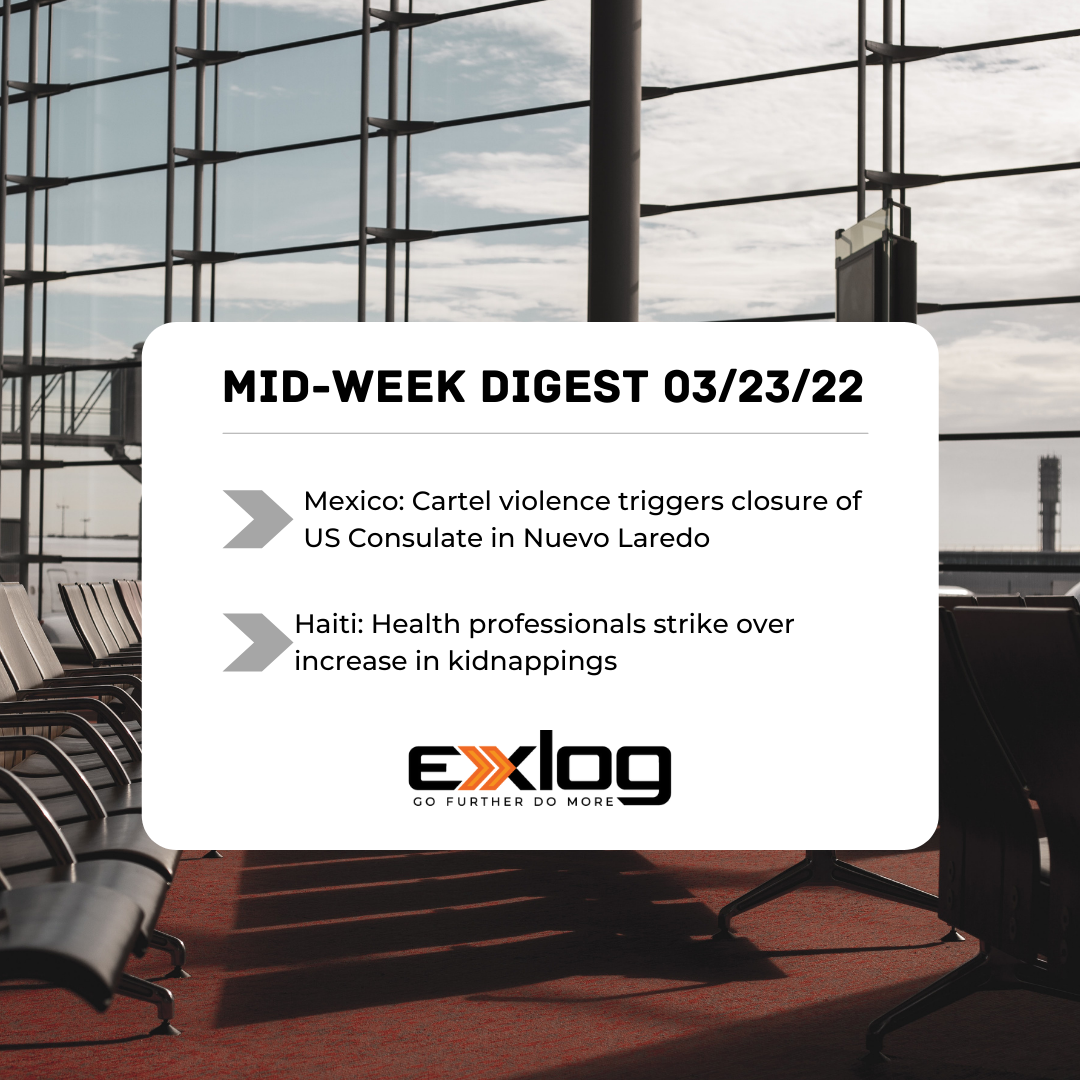Cartel violence on the US-Mexico border and Healthcare workers strike in Haiti
Mexico: Cartel violence triggers closure of US Consulate in Nuevo Laredo
Cartel violence erupted in Nuevo Laredo on March 14, prompting the temporary closure of the US Consulate and indicating a likely deterioration in the security environment in the state of Tamaulipas in the short-to-medium term. The violence was triggered by the arrest of the leader of the Cartel del Noreste (CDN), Juan Gerardo Treviño Chávez, who was extradited to the US shortly after his detention. Following his arrest, clashes between cartel members and Mexican security forces were reported across the city. Gunmen attacked the US Consulate and Mexican military premises with gunfire and hand grenades and paralyzed traffic in central Nuevo Laredo by burning vehicles and placing spike strips on several roads. A senior state official issued a statement confirming at least one fatality, but the exact number of casualties remains unclear. Southbound traffic on the international bridges that connect Texas and the state of Tamaulipas – the Juarez-Lincoln Bridge and Gateway to the Americas Bridge – was suspended for approximately five hours on March 14. Two days later, the US Department of State authorized the departure of non-emergency US government personnel and family members and announced that routine consular services in Nuevo Laredo would be unavailable until further notice. Continued attacks against the consulate are not likely as Mexican cartels normally avoid provocative actions such as deliberately targeting US government personnel and tourists with the aim of preventing significant security responses that could disrupt their operations. However, Chávez’s arrest is a significant development in Tamaulipas’s criminal landscape as it will likely weaken the CDN and present an opening for the Jalisco New Generation Cartel (CJNG) that has been competing for stronger presence in northeastern Mexico with an aim to claim strategic drug trafficking routes along the US-Mexico border. While the CDN had established solid control over Nuevo Laredo, the perceived power vacuum likely signals escalating violence in the coming months if the CJNG seizes the opportunity for territorial expansion.
Haiti: Health professionals strike over increase in kidnappings
The recent kidnappings of two doctors from the Port-au-Prince’s General Hospital prompted health professionals across Haiti to stage a three-day strike protesting a surge in gang-related kidnappings. Thousands of doctors, nurses and other members of the healthcare sector joined the strike on March 14 to demand adequate security measures from the government, paralyzing public and private health institutions in the capital Port-au-Prince and other parts of the country; only emergency rooms continued to accept patients. Protesters blocked roads with burning tires, but no incidents of violence or hostile government intervention were reported. A wave of gang-related abductions has overwhelmed Port-au-Prince and other regions of Haiti in recent months. While gangs have formed part of the security landscape in the capital for the past two decades and were often used by powerful politicians for voter suppression and other political purposes, criminal groups have expanded their influence following the assassination of President Moise in July last year. Gang violence in Port-au-Prince – approximately half of which is controlled by various criminal groups – is surging, with kidnap-for-ransom presenting a threat to both foreign and local nationals. According to the United Nations Security Council, kidnappings in the country increased by 180% in the past year. Police forces registered 655 incidents, although the actual number is likely higher as many abductions remain unreported. The 400 Mawazo gang, whose area of operations spans from eastern Port-au-Prince to the border with the Dominican Republic, is responsible for approximately 80% of all kidnap-for-ransom incidents in the country and was behind the abduction of 17 American and Canadian missionaries in Port-au-Prince in October 2021. Haiti’s economic hardship and widespread insecurity are likely to persist in the absence of strong political leadership, which is unlikely to emerge until at least the second half of the year when elections and a constitutional referendum are anticipated to occur. Meanwhile, similar labor strikes and civil unrest are expected to continue in the short-to-medium term.


